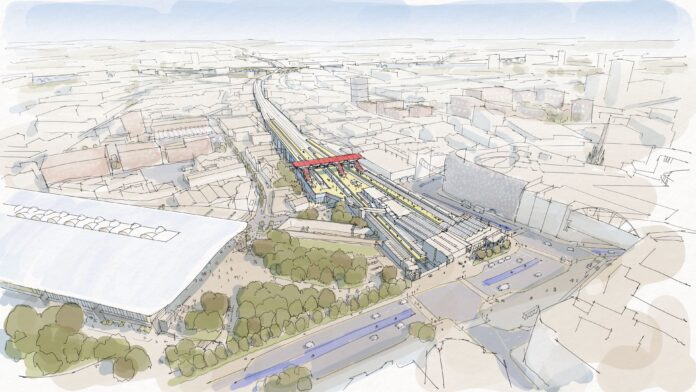The Midlands Rail Hub, a major railway upgrade project, has taken a significant step forward with the identification of four companies as preferred partners for an alliance. The group, made up of VolkerRail, Laing O’Rourke, AtkinsRéalis, Siemens Mobility, and Network Rail, will design, develop, and support the construction phase of the scheme.
The project, which could cost around £1.75 billion if delivered in full, aims to transform journeys and improve connectivity across the Midlands. The government has already committed £123 million to design and develop major changes to the railway through Birmingham.
While the larger project is planned, Network Rail is also prioritising smaller upgrades to provide quicker benefits for passengers. These include:
- Snow Hill Station: Reopening platform 4 to allow additional Chiltern Railways services to run directly between Birmingham’s business district and London Marylebone.
- Kings Norton Station: Redeveloping the station and its lines to add extra Cross City trains and enable new services from the Midlands Rail Hub.
The biggest change will be connecting the Chiltern main line to the Camp Hill lines via two new chords in Bordesley, near Birmingham city centre. This transformation will allow more train services on key routes and significantly improve connections for millions of people.
Rail Minister Lord Peter Hendy said: “The Midlands Rail Hub will be transformational for economic growth, jobs and homes in the region, and it’s great to see this new alliance ready to deliver vital improvements that will deliver for passengers and freight. With £123 million already released to Network Rail, as part of its Plan for Change, this Government is forging ahead with its promise to create the modern transport system Britain needs and deserves.”
Denise Wetton, Network Rail’s Central route director, said: “Midlands Rail Hub is a brilliant example of the benefits the railway provides to the everyday lives of people, communities and businesses. It will connect more people with new opportunities, create new jobs and access to careers, and be a catalyst for much-needed house building. Identifying the preferred alliance partners is a really important step and highlights the commitment and intent to deliver a project of this size and the huge amounts of benefits it will provide to the Midlands and beyond.”
The alliance partners will now work on a detailed plan for the project, with the first passenger benefits expected to be realised by the early 2030s.
Maria Machancoses, chief executive of Midlands Connect, said: “Midlands Rail Hub is moving forward at pace and we will continue to work with the Mayors, local leaders and our partners to ensure its benefits reach up to 50 locations across the East and West Midlands. By solving major gaps in connectivity across the region, Midlands Rail Hub will improve services to major economic hubs and boost our local economies.”





